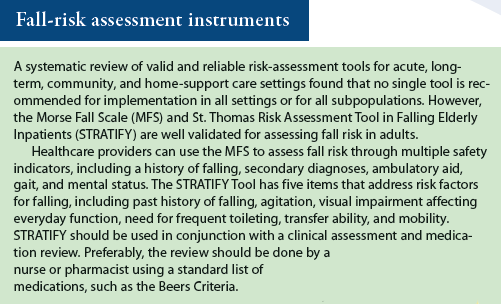How Dementia Fall Risk can Save You Time, Stress, and Money.
Table of ContentsThe 10-Second Trick For Dementia Fall RiskThe smart Trick of Dementia Fall Risk That Nobody is DiscussingDementia Fall Risk - TruthsTop Guidelines Of Dementia Fall Risk
An autumn danger analysis checks to see just how likely it is that you will certainly fall. The assessment usually consists of: This consists of a collection of concerns about your general health and wellness and if you've had previous falls or problems with balance, standing, and/or strolling.STEADI includes testing, assessing, and treatment. Treatments are suggestions that may lower your risk of dropping. STEADI includes 3 steps: you for your risk of dropping for your danger factors that can be enhanced to attempt to stop drops (as an example, equilibrium issues, damaged vision) to minimize your risk of dropping by making use of reliable methods (for instance, giving education and learning and sources), you may be asked numerous questions including: Have you fallen in the previous year? Do you feel unstable when standing or strolling? Are you bothered with dropping?, your provider will certainly check your toughness, balance, and gait, utilizing the following loss analysis tools: This test checks your stride.
You'll rest down once again. Your copyright will certainly inspect how long it takes you to do this. If it takes you 12 seconds or more, it might indicate you are at greater threat for a loss. This test checks toughness and equilibrium. You'll being in a chair with your arms went across over your chest.
The settings will certainly obtain tougher as you go. Stand with your feet side-by-side. Relocate one foot midway ahead, so the instep is touching the big toe of your various other foot. Relocate one foot totally before the other, so the toes are touching the heel of your various other foot.
Fascination About Dementia Fall Risk
Many falls occur as an outcome of multiple contributing elements; consequently, taking care of the danger of falling starts with determining the variables that add to drop danger - Dementia Fall Risk. A few of one of the most pertinent threat aspects include: Background of prior fallsChronic clinical conditionsAcute illnessImpaired gait and balance, lower extremity weaknessCognitive impairmentChanges in visionCertain high-risk medications and polypharmacyEnvironmental variables can also enhance the risk for drops, consisting of: Inadequate lightingUneven or damaged flooringWet or unsafe floorsMissing or damaged handrails and get hold of barsDamaged or improperly fitted equipment, such as beds, wheelchairs, or walkersImproper usage of assistive devicesInadequate guidance of the individuals living in the NF, including those see this site who display aggressive behaviorsA successful loss danger monitoring program calls for an extensive medical evaluation, with input from all participants go to these guys of the interdisciplinary group

The treatment plan ought to likewise consist of interventions that are system-based, such as those that promote a safe atmosphere (appropriate lights, hand rails, order bars, and so on). The effectiveness of the interventions must be examined regularly, and the care plan revised as needed to mirror modifications in the loss danger assessment. Carrying out a fall danger monitoring system utilizing evidence-based ideal technique can reduce the occurrence of drops in the NF, while restricting the capacity for fall-related injuries.
3 Simple Techniques For Dementia Fall Risk
The AGS/BGS standard recommends evaluating all grownups aged 65 years and older for loss threat every year. This testing contains asking people whether they have actually fallen 2 or even more times in the previous year or sought clinical interest for a fall, or, if they have not dropped, whether they really feel unsteady when strolling.
People that have actually fallen as soon as without injury needs to have their balance and gait assessed; those with stride or balance abnormalities ought to get extra analysis. A history of 1 loss without injury and without stride or equilibrium problems does not necessitate further assessment past continued annual loss risk testing. Dementia Fall Risk. A loss threat evaluation is required as part of the Welcome to Medicare assessment
-copy-5.jpg)
Dementia Fall Risk Things To Know Before You Buy
Recording a falls background is one of the high quality indicators for fall avoidance and management. Psychoactive medications in particular are independent forecasters of drops.
Postural hypotension can usually be relieved by reducing the dosage of blood pressurelowering drugs and/or quiting medicines that have orthostatic hypotension as a side result. Use above-the-knee assistance hose and copulating the head of the bed boosted may likewise minimize postural reductions in blood pressure. The preferred aspects of a fall-focused checkup are displayed in Box 1.

A pull time above or equal to 12 secs suggests high autumn risk. The 30-Second Chair Stand test assesses lower extremity strength and equilibrium. Being unable to stand up from a chair of knee height without using one's arms shows raised autumn threat. The 4-Stage Balance test evaluates static balance by having the client stand in 4 placements, each considerably extra tough.